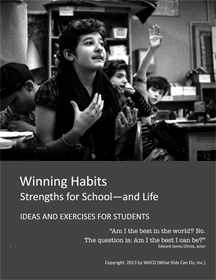Certain people set off a challenge that cannot be reached, that can’t be like a goal, that just kinda like impossible. And I think that happens to . . . it happens to everybody. It’s happened to me before. I mean, it happens, but you just gotta go back out there and make a goal that’s like realistic, that like you know you can do. And making goals that are too easy . . . they’re just pointless. Like they don’t really do anything. It’s really like you have to know yourself and know your capabilities and know what you can do. And that...that’s . . . those are the type of goals that you need to make. - Kenneth
Last year, I had a lot of challenges coming, since I came halfway through the first quarter. I really didn’t care…I just found it in myself that I already fell into the hole, my life hole and I really couldn’t get out of it. And then towards the end of the year when I was failing all my classes they had this program I think it was called Club 10 – every day after school until 5 o’clock you have to stay after and work. And it was like this big challenge for me because it wasn’t just one class, it was most of my classes, so having to do all that work every day and having to stay after with teachers and redo essays and trying to get myself out of staying back and trying to get out of summer school (even though I went –just for 1 class) so I felt that after that year I felt like I gave it my all and passing most of my classes and flunking just one is like the biggest challenge I overcame and like actually knowing that I was going to get held back and working myself up. - Carla
March 17, 2015
PROVIDENCE, RI —Every day, we hear that young people need more than academic "smarts" to prosper. They must also develop “character strengths” like grit, curiosity, conscientiousness, even optimism. They need to learn self-control and how to manage stress. The more curious and resourceful students are, the better. They need self-confidence—the belief that they can succeed in spite of obstacles. Educators often call this “social-emotional learning": the skills that don’t show up on standardized tests.
Two years ago, WKCD produced an 11-minute video for middle and high school students that includes clips of student talking about critical social and emotional skills: managing stress, self-control, motivation, persistence, curiosity, resourcefulness, and self-confidence. The video is intended to prompt discussion among students, with many places to pause and reflect. We are posting it again because we believe it merits a fresh look.
We created a short booklet, too. Together, the video and handbook underscore two BIG points:
- Doing well in school isn’t only about academic “smarts.” It’s also about habits, like self-control and motivation. These habits—or strengths—help us succeed in school and life.
- Like muscles, both academic smarts and good habits can be built through practice.
Winning Habits: Strengths for School—and Life
Ideas and Exercises for Students




